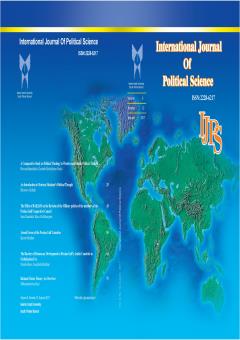The Role of Qassem Soleimani's Performance in the National Security of the Islamic Republic of Iran
Subject Areas :
Yaser Soleimani
1
,
Behnaz Azhdari
2
*
![]() ,
Mehdi Hassani Bagheri
3
,
Mehdi Hassani Bagheri
3
1 - Department of Political Science, Baft Branch, Islamic Azad University, Baft, Iran
2 - Department of Political Science, Baft Branch, Islamic Azad University, Baft, Iran
3 - Department of Political Science, Baft Branch, Islamic Azad University, Baft, Iran
Keywords: National Security, Resistance Discourse, Political Security, Military Security,
Abstract :
Qassem Soleimani, as a prominent figure of resistance and a symbol of Iranian-Islamic identi-ty, as well as the fight against terrorism worldwide, by establishing a modern school, contrib-uted to national solidarity and the promotion of Shia identity. This, in turn, strengthened the national security of the Islamic Republic in both military and political dimensions. Soleimani emerged as a national hero during the Iran-Iraq War and in the fight against ISIS, embodying a model of national champion. Therefore, his independent personality became an influential factor in advancing national security for the Islamic Republic. Considering himself a home-land soldier, Soleimani, while defending Islam, also symbolized the defense of the homeland. Accordingly, the goal of this research was to identify and explain the role and performance of Qassem Soleimani in the national security of the Islamic Republic and answer the question of what role his performance played in Iran's national security. The research methodology was descriptive and analytical, both in terms of the primary objective and the method of data col-lection. The research results indicate that Qassem Soleimani, through the creation of a dis-course of resistance and mobilization of resources, contributed to strengthening the national security of the Islamic Republic.
Bahman, Shueib (2020). The Great Work of Haj Qasem, Turning Threat into Opportunity, KHAMENEI.IR In-formation Base.
Buzan, Barry, Ole WÆVER, and Jaap de WILDE. Security: A New Frame-work for Analysis. Boulder, CO: Lynne Rienner, 1998
Buzan, Barry. People, States and Fear: An Agenda for International Security Studies in the Post-Cold War Era. Harlow: Pearson Education Limited, 1991.
Dagres, Holly (2021), The Qasem Soleimani assassination feels like ages ago—but Iran hasn't forgotten, Atlantic Council.
Haji Najari, Abbas (2021). The Most Nation-al and International Figure in the Is-lamic World, Islamic Republic News Agency.
Hashemi, Amir and Rezai, Alireza (2019). The Influence of Identity Insecurity on the Spread of Neo terrorism in the Middle East with a Focus on Iran and Saudi Arabia, International Relations Studies Quarterly, Number 45, Spring.
Mohammadi, Manouchehr (2003). America's Military Strategy After September 11, Tehran: Soroush.
Moshirzadeh, Homeira (2006). Analysis of the Islamic Republic of Iran's For-eign Policy from the Perspective of Structuralism: A Look at the For-eign Policy of the Islamic Republic of Iran, Mosaffa, Nasrin and Hossein Norouzi, Tehran, Office of Interna-tional Studies and Ministry of For-eign Affairs.
Motalebi, Masoud and Jamal Khan Mo-hammadi (2017). Harmony between Government and People and Its Im-pact on the Economic Development of Societies: A Longitudinal-Comparative Study between the Years 1990 to 2004 AD, Govern-ment Quarterly, Faculty of Law and Political Science Journal, Year 3, Number 9, Spring.
Mottaghi, Ebrahim (2021). Session on "Na-tional Power and Regional Order in General Soleimani's School," Cul-tural and Social Deputy of Razi Uni-versity.
Mundell, Robert (1998). The Variable Face of National Security, Strategic Stud-ies Research Institute.
Mundell, Robert (2016). The Variable Face of National Security, Translator: Strategic Studies Research Institute, Tehran: Strategic Studies Research Institute.
Nasri, Ghadir (1997). "Copenhagen School: Theoretical Foundations and Practi-cal Criteria of Defense and Security Studies," Number 33, pp. 58-33.
Nasri, Ghadir (1997). Copenhagen School: Theoretical Foundations and Practi-cal Criteria, Defense and Security Studies, Number 33.
National Security from the Perspective of General Soleimani (2019). Newspa-per No. 5077, News No. 372812.
Pak Ayin, Mohsen (2020). Haj Qasem and the Theory of Regional Security, Khabar Online.
Pourhassan, Naser and Rekabian, Rashid (2021). Discourse of Resistance and the Second Step of the Islamic Revolution, Research on the Islamic Revolution, Volume 10, Number 4, Issue 39.
Rezaei, Ali Akbar (2005). A Theoretical Ex-amination in the Field of Iran's For-eign Policy: Achievements and Rec-ommendations, Foreign Policy Quar-terly, Volume 19, Number 1.
Soufan, Ali (2018). Haj Qassem: The Strongest General in the Middle East and the Architect of Iran's Powerful Strategy, Monthly "Center for Com-bating Terrorism."

